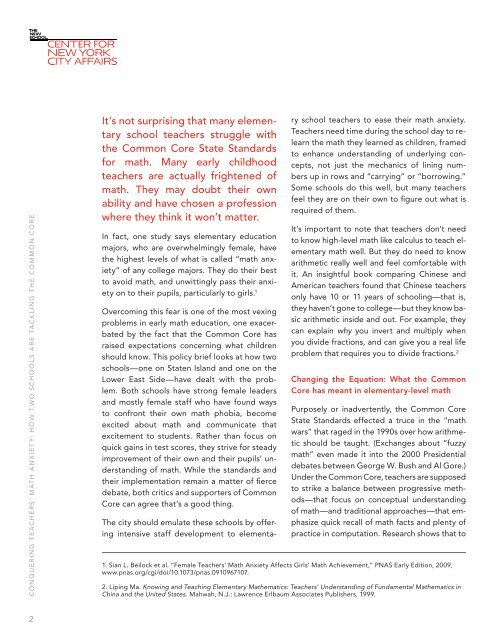Math+Anxiety+4
Math+Anxiety+4
Math+Anxiety+4
You also want an ePaper? Increase the reach of your titles
YUMPU automatically turns print PDFs into web optimized ePapers that Google loves.
CONQUERING TEACHERS’ MATH ANXIETY: HOW TWO SCHOOLS ARE TACKLING THE COMMON CORE<br />
It’s not surprising that many elementary<br />
school teachers struggle with<br />
the Common Core State Standards<br />
for math. Many early childhood<br />
teachers are actually frightened of<br />
math. They may doubt their own<br />
ability and have chosen a profession<br />
where they think it won’t matter.<br />
In fact, one study says elementary education<br />
majors, who are overwhelmingly female, have<br />
the highest levels of what is called “math anxiety”<br />
of any college majors. They do their best<br />
to avoid math, and unwittingly pass their anxiety<br />
on to their pupils, particularly to girls. 1<br />
Overcoming this fear is one of the most vexing<br />
problems in early math education, one exacerbated<br />
by the fact that the Common Core has<br />
raised expectations concerning what children<br />
should know. This policy brief looks at how two<br />
schools—one on Staten Island and one on the<br />
Lower East Side—have dealt with the problem.<br />
Both schools have strong female leaders<br />
and mostly female staff who have found ways<br />
to confront their own math phobia, become<br />
excited about math and communicate that<br />
excitement to students. Rather than focus on<br />
quick gains in test scores, they strive for steady<br />
improvement of their own and their pupils’ understanding<br />
of math. While the standards and<br />
their implementation remain a matter of fierce<br />
debate, both critics and supporters of Common<br />
Core can agree that’s a good thing.<br />
The city should emulate these schools by offering<br />
intensive staff development to elementary<br />
school teachers to ease their math anxiety.<br />
Teachers need time during the school day to relearn<br />
the math they learned as children, framed<br />
to enhance understanding of underlying concepts,<br />
not just the mechanics of lining numbers<br />
up in rows and “carrying” or “borrowing.”<br />
Some schools do this well, but many teachers<br />
feel they are on their own to figure out what is<br />
required of them.<br />
It’s important to note that teachers don’t need<br />
to know high-level math like calculus to teach elementary<br />
math well. But they do need to know<br />
arithmetic really well and feel comfortable with<br />
it. An insightful book comparing Chinese and<br />
American teachers found that Chinese teachers<br />
only have 10 or 11 years of schooling—that is,<br />
they haven’t gone to college—but they know basic<br />
arithmetic inside and out. For example, they<br />
can explain why you invert and multiply when<br />
you divide fractions, and can give you a real life<br />
problem that requires you to divide fractions. 2<br />
Changing the Equation: What the Common<br />
Core has meant in elementary-level math<br />
Purposely or inadvertently, the Common Core<br />
State Standards effected a truce in the “math<br />
wars” that raged in the 1990s over how arithmetic<br />
should be taught. (Exchanges about “fuzzy<br />
math” even made it into the 2000 Presidential<br />
debates between George W. Bush and Al Gore.)<br />
Under the Common Core, teachers are supposed<br />
to strike a balance between progressive methods—that<br />
focus on conceptual understanding<br />
of math—and traditional approaches—that emphasize<br />
quick recall of math facts and plenty of<br />
practice in computation. Research shows that to<br />
1. Sian L. Beilock et al. “Female Teachers’ Math Anxiety Affects Girls’ Math Achievement,” PNAS Early Edition, 2009,<br />
www.pnas.org/cgi/doi/10.1073/pnas.0910967107.<br />
2. Liping Ma. Knowing and Teaching Elementary Mathematics: Teachers’ Understanding of Fundamental Mathematics in<br />
China and the United States. Mahwah, N.J.: Lawrence Erlbaum Associates Publishers, 1999.<br />
2


